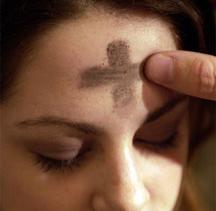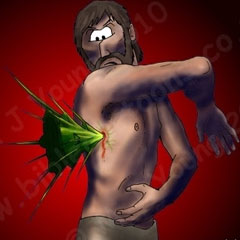From time to time secondary school students request my assistance in their research assignments. In the past, I have received questionnaires on euthanasia, abortion and homosexuality.
This week I received a questionnaire which surveys my views on Heaven and Hell. Of course, as much as possible I conform my views to the Church’s views, so I thought I’d share my answers here.
How do you define Heaven?
Heaven is the beatific vision, wherein we see God face to face. It’s the infinite satisfaction of the ultimate yearning, and the experience of perfect love.
How do you define Hell?
Hell is the complete absence of God, and the terrible triumph of ego. The Other is withdrawn completely, and one’s universe is reduced to self.
Hell is also eternal punishment for sin, or put another way, the natural and logical fruit of a life of egotism.
How do you define Purgatory?
This explanation of Purgatory comes from a wise Jesuit priest who was Spiritual Director in the seminary for many years.
We can imagine a great many people lining up at the Gates of Heaven on the morning of September 11, 2001. Among them were nearly 3,000 victims of terrorism, and 19 agents of terrorism. St Peter welcomes them all, and explains a few things.
“In Heaven, there are no half-measures. Every citizen of Heaven loves God with their whole heart, whole soul, whole mind and whole strength. And we love each other that way too. So who’s ready to enter?”
We can then imagine the victims contemplating the pain their premature deaths have caused their loved ones, and struggling to forgive and love their murderers. We can imagine the terrorists looking at their infidel victims, whom they hated and willingly killed in the name of Allah, and struggling to love them.
Until all these people can love as God loves, they are unable to enter Heaven. The time and effort it takes for them to get to that point is what Catholics call Purgatory.
To what extent is a belief in Heaven and Hell relevant to your life? Why?
Heaven is not only my ultimate personal objective, but also my professional objective. My job, as a Catholic priest, is to bring souls to Heaven.
Hell is relevant insofar as it’s the negative correlative to Heaven. I need to avoid Hell personally. And I need to deliver souls from Hell. But my focus is on Heaven, not Hell.
How does your belief in Heaven and/or Hell influence your values?
As much as possible, I value holiness and strive for it, and I teach others to do likewise. Holiness is good for us in this life and the next. Holiness makes the world a better place; it attracts people to oneself and more importantly it attracts them to Christ; and it opens oneself up to grace, by which souls are received into Heaven. Heaven cannot be earned of course. Heaven is grace — a gratuitous gift given by God, not earned by us.
As much as possible, I avoid sin, and I teach others to avoid sin. Not only to avoid sin, but to despise sin as the ultimate evil. There is nothing in the world we should really fear, except sin. Not harm, nor death; only sin.
How does your belief in Heaven and/or Hell influence your actions?
I try to examine my conscience every day, so I am alert to defects and vices, and any sins I might have committed in thought, word or deed. I make an act of contrition and ask God for the grace not to sin again.
I try to get to confession every week to confess my sins and receive absolution. The formal act of contrition which I use in confession contains a reference to Heaven and Hell:
“Oh my God, I repent with my whole heart of all my sins, and I detest them, because I have deserved the loss of Heaven and the pains of Hell, but most of all because I have offended you in your infinite goodness . . .”
In the same way, I encourage Catholics to frequent sacramental confession and to never stop struggling against sin and towards holiness. The same goes for non-Catholics too of course, except for the bit about sacramental confession.
I have not ministered the rite of exorcism myself — that only occurs with case-by-case permission of the bishop — but I have assisted an exorcist priest in assessing cases. I have seen it with my own eyes: the demonic is real and dangerous. I take the occult very seriously, and I warn people against seances, Ouija boards, New Age practices, etc.
I often bless and exorcise holy water and blessed salt, and I encourage people to use these sacramentals liberally, whenever and wherever they feel oppressed by evil spirits. In this instance I’m not talking about ghosts or demons, but oppressive experiences like extreme envy, depression, lust, and obsessive/addictive behaviours. There is often a spiritual component to these afflictions, which demand a wholistic response, not an exclusively materialistic one.
Maybe the most significant action, though, is my prayer. I try to spend half an hour each morning and each evening sitting before the tabernacle. During these times I bring a book which I might read for a few minutes now and then, but mostly I just talk to the Lord about my day, about friends and associates, and about life in general. I also spend time listening. By that I mean I still my body and my mind, and focus on the presence of Jesus in the Eucharist. Sometimes I’m filled with understanding and spiritual consolations, most times nothing much occurs, and on occasion it’s a real battle to stay and pray. But I try to be faithful to these times of prayer, and I look forward to Heaven, when prayer will be as effortless and as satisfying as the best times spent with friends.
How much has your belief in Heaven changed throughout your life? If so, why did your belief change?
I remember a conversation I had in grade prep, driving home from school. I declared that in Heaven, we’ll never be short of Tim Tams, and we can eat them all the time. My tastes have changed a bit since then. I like St Brigid’s vison of a lake of beer:
I should like a great lake of beer to give to God.
I should like the angels of Heaven to be tippling there for all eternity.
I should like the men of Heaven to live with me, to dance and sing . . .
. . I should like Jesus to be there too.
I’d like the people of heaven to gather from all the parishes around.
I’d give a special welcome to the women,
the three Marys of great renown.
I’d sit with the men, the women of God,
There by the great lake of beer
We’d be drinking good health forever,
And every drop would be a prayer.
It’s very natural, I think, for us to mature in our understanding of Heaven. It’s much deeper than never-ending Tim Tams, white clouds and golden harps. As I spend time with our Lord every day, and grow more deeply in love with God, my vague imagining of Heaven deepens too. But at the end of the day, I’m with Paul on this one:
“So we read of, Things no eye has seen, no ear has heard, no human heart conceived, the welcome God has prepared for those who love him.” (1 Cor 2:9)
How much has your belief in Hell changed throughout your life? If so, why did your belief change?
My belief in Hell has changed quite significantly. There was a time when I suspected that it was a mediaeval construct, something used to scare and exploit the credulous. But when I was 19 or 20, I took an intensive course in the Silva Method, which claims to unleash hidden powers of the mind by means of willpower and transcendental meditation. In a very short time I was receiving detailed and correct information about strangers from a “spiritual advisor” whom I assumed was a figment of my imagination, and I was also practising reiki.
My grandmother was very dubious, and gave me a book which links the Silva Method and other “mind-control” pseudosciences to the occult. I read the book, and took it to prayer, and I was soon convinced that my insights were not co-incidental, and the powers I used were not my own. For the first time in many years, I went to confession and requested deliverance and absolution. The priest was not only sceptical, but quite dogmatic in his rejection of my account, but that’s par for the course. Many priests take the view that hell and the devil are metaphorical , which is not faithful to the Catholic tradition.
Anyway, after this experience, I learnt more about my faith, and became a more committed and active Catholic. I fear Hell very much. That’s not to say I fear an angry and vengeful God. I don’t relate to Jesus that way at all — and it is Jesus who judges us, not our Heavenly Father. I put much faith in our Lord’s divine mercy, which diminishes any fear I might have in his divine justice. However, I still fear, very much, my own capacity to reject God. To turn away from the true and the good and the beautiful, for the sake of my own ego. I am a selfish and proud person. Many times in the past I have cut off my nose to spite my face. Some people sincerely wonder how anyone could possibly be in Hell. Not me. I can too easily imagine condemning myself, and stubbornly refusing the Lord’s entreaties.
Do you think that Heaven and Hell are relevant to Australians today? Why or why not?
I think Heaven and Hell are absolutely relevant to modern Australians because none of us are immortal, and within the next century or so, every one of us will have to choose our eternal destiny. Will it be Heaven? Or will it be Hell?
But I’d add that Heaven and Hell are irrelevant to modern Australians insofar as very few actually believe in one or even both. One of the devil’s greatest triumphs is the widespread disbelief in his existence, and Hell’s existence. Unbelief doesn’t make Heaven or Hell any less real, but it does diminish their relevance in people’s daily lives.






Thank you Fr John – so well explained. Your explanation that our understanding of the concepts of Heaven and Hell changes with prayer is so true, and although you write from personal perspective ( which makes it even more easy to understand), your account is universal.
Thanks Elizabeth. Credit too, to the student who prepared these questions. I was learning even as I was answering!
I really enjoyed reading this article by Father John. When I was a young girl I saw Father God as a King marking down all my wrongdoing . As a mother I was invited to help Sr Monique to prepare my daughter For First Holy Communion. Lesson number one God is a God of unconditional love. I began to see things very differently. Heaven I see as Father John does. Seeing God face to face. Happiness unlike what we experience here on Earth. Hell was a fearsome place where our sinfulness leads us if we don’t confess our sins and seek forgiveness. Now I turn my eyes towards Jesus and pray that He leads me onto the right path. I find prayer, the mass and the rosary helps me to keep on track. Forgiveness is the key to freedom. Freedom from my ego and the things of this world. Purgatory is purification of my sins and I pray every day for the souls in Purgatory as I can help them through prayer and they can also help me.
Mass and the rosary. How true. As our Lady said to the children of Fatima, after showing them a vision of the souls in Hell, “Pray! Pray! Pray!”
I teach my children the importance of turning away from sin, not because one fears hell, but because it would cause much pain for God to see us go to hell. We must be able to identify sin in order to understand truth. One must fear the concept of loosing the sight of God and the love He has for us, more than anything. And once one understands this, he can truly understand how beautiful Gods love is in His infinite mercy.
Yes. How much it must distress our Lord, to see even one soul lost from his company. Not only because he shed his blood for that person, but because he loves them more than he loves himself.
Great article Fr John. When doing an exorcism how do you distinguish between demons and mental illness?
Good question Daniel! Not being an exorcist myself, I can’t give a definitive answer, but I have learnt something from priests who are exorcists.
In most cases, the Church is approached only after psychological treatment has been sought. A prudent exorcist (and imprudent priests are not commissioned to be exorcists!) will seek out the professional opinion of those psychological care givers before proceeding. Natural explanations and treatments are exhausted before preternatural explanations and supernatural treatments are addressed.
I imagine heaven to be a permanent state of intoxication caused by seeing God and feasting on Him. Sometimes I feel like this at Mass on Sundays; mildly ecstatic.
My increasing self-knowledge causes me to cry out to the Virgin Mother to hold my hand and smack me if I stray and to over-ride my selfish will with her pure one, to bring me to Jesus..
The Divine Mercy is my only hope. I totally get Pope Francis, who is trying to shove, beguile, nudge sheeple humanity under the fount of Mercy gushing forth from Christ’s pierced Heart.
Our last chance. The more grotesque and audacious mankind’s collective sin; the more profuse the Saviour’s agony of love and Mercy.
I don’t want His agony and incomprehensible Love to be wasted.
But to unbelievers I say sometimes, “We’re all going to die and we have to go somewhere: heaven or hell.” Often people need to get a fright. I did.
Like what I said, only more poetically expressed! ?